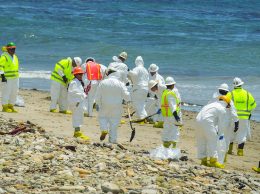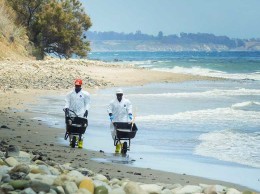Dubroff: Plains prosecution either carefully crafted or grandstanding

Henry Dubroff
There are two ways to look at the May 17 announcement that Plains All American Pipeline will face criminal charges over last year’s Refugio oil spill.
During a press conference that made national news, California Attorney General Kamala Harris and Santa Barbara County District Attorney Joyce Dudley said that a California grand jury had indicted Plains on 46 counts, including four felonies, and a mid-level employee on several misdemeanor counts. The felony indictments remain under seal; Plains denied the charges.
One way to look at the events that unfolded 48 hours before a one-year statute of limitation, is that this is purely a case of political grandstanding. The dozens of misdemeanor counts are a mere wrist slap; the maximum fines of around $3 million are chump change for Plains. But the political benefits are huge for the prosecutors.
Under the grandstanding scenario, Harris, widely viewed as the frontrunner to replace outgoing U.S. Sen. Barbara Boxer, could not let an environmental disaster go unpunished. Doing so would damage her cred with green voters as well as the billionaire political funders who want a fossil fuel-free economy. Dudley, an effective district attorney, saw a chance to raise her profile, too.
The second way to look at the indictments is that this is a carefully crafted case that’s aimed at getting convictions – not an overarching prosecution that tries to put the company, and its top executives, on trial for the business practices that led to the disaster.
Although the Refugio spill was the worst oil leak disaster in decades on the Central Coast, there were no reported human injuries and of the estimated 123,000 gallons that spilled from a broken pipeline, roughly 21,000 gallons seeped into the ocean.
Without injuries or massive property damage, the prosecution’s options were limited to charges related to harm to animals, the discharge of pollutants into state waters and compliance with state rules on notification when a leak occurs. There may or may not be charges related to the maintenance of Pipeline 901. It was subject to federal, not state, inspection.
In the carefully crafted case scenario, prosecutors made a realistic assessment of what might probably get them a conviction, made their case to a grand jury and got what indictments they could.
Until we hear from the feds and the indictments are unsealed, it’s hard to know how much grandstanding is involved. But filing a criminal case that has some chance of sticking does have implications for other litigation that’s progressing slowly forward.
By indicting Plains and regulatory compliance specialist James Buchanan, civil litigants will get access to depositions, documents and other evidence that could strengthen their claims.
Any guilty pleas or convictions will go on the record and help the civil litigants, including those involved in a burgeoning class-action suit filed by attorney Barry Cappello and others, in their quest for compensatory and perhaps punitive damages. The ability of prosecutors to inflict financial pain on defendants involved in parallel civil litigation is practically unlimited.
Second, by indicting Buchanan, a relatively low-level employee, the prosecutors gain an entry point to see what they can find out about behavior up the chain of command. This is the classic prosecutorial maneuver of charging people low on the totem pole first. From the Watergate burglars who brought down a president to a slew of insider trading cases that put CEOs in jump suits, this is the way it works.
Finally, there are some wild cards. Venoco, which filed for bankruptcy protection earlier this year, has said it lost millions because it couldn’t use Plains pipelines 901 and 903. It might piggy back on the criminal prosecutions and seek a mammoth claim. It’s just one of several oil companies that lost money when the pipelines were shut. Perhaps former owner Tim Marquez, who was reduced to a minority shareholder in the Venoco bankruptcy, will have a claim.
None of this is a slam dunk. Plains is no stranger to litigation and it will dig in, fight hard, delay, possibly ask for a change of venue, and force the state to spend real money to prosecute. It will likely go to court and whittle away at the charges; Buchanan may well ask for his case to be dismissed.
Criminal charges definitely raise the financial stakes for Plains, which has said that insurance will cover an estimated $186 million of the estimated $269 million in spill-related costs. But in the absence of new evidence related to pipeline maintenance, the indictments are unlikely to change the way the company does business.
• Reach Editor Henry Dubroff at [email protected].










